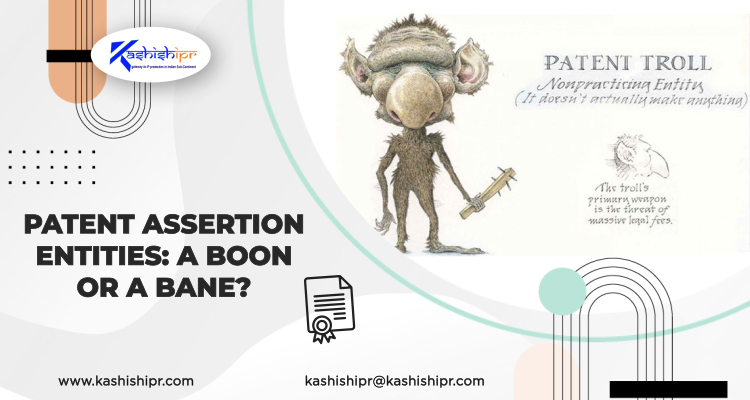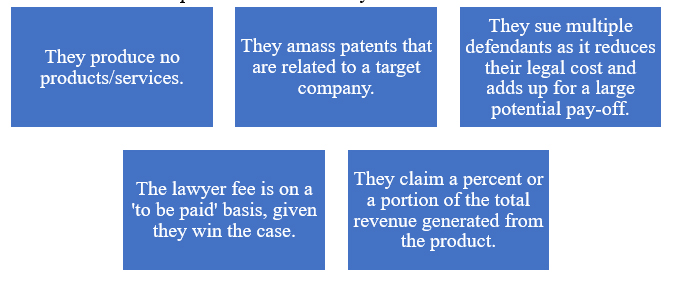
The term ‘Patent Troll’ originated in 1994 in an educational video by Paula Natasha Chavez called the ‘Patents Video.’ A patent troll is a term used for describing a company that uses Patent Infringement claims to win arguments and court judgments for profit or to stifle competition. It is what gets in easy money and therefore, often termed as a ‘patent shark,’ ‘dealer,’ ‘marketer,’ or ‘pirate.’ A patent troll operation may be called a ‘patent assertion company,’ ‘entity,’ or a ‘non-manufacturing patentee.’ It simply utilizes legal loopholes in bad faith.
The internet has resulted in the era of patent trolls, directly or indirectly. The maximum number of cases are witnessed in the software industry wherein statistics project that as many as 74 percent of the patents issued are being litigated. Facts also suggest that 90 percent of these cases are decided in favor of the defendants.
There are two sides to a coin, and therefore, while patent enforcing entities are always looked down on, there is another side to the story where they can do well to inventions – the extent of the same, however, stands questioned. Before uncovering whether patent assertion entities are a boon or a bane, let’s look into the ‘patent trolls’ as is commonly held by the majority.
Characteristics of a Patent Assertion Entity
The common attributes of a patent assertion entity have been enumerated as follows:-

Mode of Operation of Patent Assertion Entities

- Patent trolls come into being without there being any intention of making use or manufacturing a said invention to provide them as a product or service for public consumption.
- They also pursue patent infringement claims that are unsubstantiated with the intent of stifling competition. These claims are ultimately easier and cheaper for competing companies in the market to settle rather than to litigate.
- Another strategic method deployed by patent assertion entities is that they buy a patent with the primary intent of suing the competitor by alleging that the product of another infringes upon their newly purchased patent.
- Such entities might also involve any other kind of utilization of a patent to enforce the Patent Rights only for accruing profits.
Some companies that have been labeled patent trolls are Intellectual Ventures Management, LLC, Acacia Research Corp., and Lodsys, LLC.
Point of View 1: Patent Trolls do not Hurt Innovation
According to this viewpoint, patent trolls give way for further innovation. Patent trolls often conduct through IP Due Diligence to acquire high-quality patents capable of exponential monetization. Also, these dealers streamline research and development initiatives towards designing around those patents. The same results in an increment of a said invention, which, in turn, leads to advancement within a particular industry. It not only helps the industry by advancing it and making available relevant choices for consumers but also leads to more competition, which ultimately means lesser prices. Consider, for example, the telephone or television manufacturing industry. Since the number of trolls operating therein is at the maximum rate, the prices have seen a rapid decline over the years.
Patent trolls, as per this point of view, do well to the economy as well as to the inventor since litigation cost has the potential to leave the inventor bankrupt. Such patent assertion entities, however, do not intend on leaving the inventor bankrupt rather assure the inventor a sizable profit without settling in court through negotiation.
Point of View 2: Patent Trolls do Hurt Innovation

Let us consider a few facts as having been enumerated below, which would help determine the nature of loss incurred due to patent trolling:
- Judicial Suits and Damages: Research concludes that patent trolls cost heavily on defendant firms, which may be as much as $29 billion per year as a direct out-of-pocket cost. In aggregate, patent litigation damages over $60 billion in firm wealth each year, while the mean damages in a patent lawsuit reach up to around $50,000.
- Direct Effect on Innovation: Where an inventor is confronted by a suit addressing a patent troll, the innovation cost or the cost diverted for further research and development in the concerned area witnesses a drop. It has been found that the decline in R&D expenditure is as much as -48% for a large firm and -19% for a small firm. The same results in termination of the existent business lines or change of strategy depending on the nature of the firm, which ultimately also harms the sector that is being exploited by such infringers or operating patent assertion entities.
- The Irrespective Threat of Trolls: It would be correct to say that patent trolls do not only dig big firms to entrap them but also small and medium-sized startups. Research projects that a majority of such patent assertion entities target those firms that make less than $100 million in a year. Also, innovative firms excelling based on their research and development efforts have a greater likelihood of being sued.
How to Protect your Firm against such Patent Assertion Entities

- Analyzing the Portfolio and Identifying Assets: An entity needs to map the assets of its company, including all Intellectual Property Rights (IPRs) held against its name. After gathering the relevant information, a detailed check of the existent rights should be carried out to find if the rights against the asset have been registered; if registered, the timeline remaining, etc. The same will help collate data on all the assets and guide towards making a strategy suitable to the nature of assets held.
- Draft Specific Agreements: Always consider drafting specific agreements when dealing with third-parties in a transaction involving IPRs. It includes the signing of Non-Disclosure Agreements (NDAs) when required as well as agreements requiring parties to disclose the IPRs held with other partners to assess liability risks.
- Public Acquisition: It is always a good option to make an acquisition concerning a patent or an Intellectual Property (IP) asset transaction since, at a later stage, patent trolls will not be able to claim that they did not know who held the patent.
- Insurance: Considering a subscription to an insurance policy would help negate the threat of unforeseen expenditure in the event of litigation. It would help optimize the cost and risk management strategy of the entity.

- Protection against Document Leakage: Patent trolls are known for their research abilities and can find a needle in the haystack to find anything that can be twisted into a patent infringement accusation. Therefore, one must ensure that the entity’s research work is safeguarded against any hacker or potential infringer who has access to such information.
Concluding Remarks
Some studies, as has been noted above, point out that patent trolls, on one side, can be effective in boosting the economy and innovation through innovating around a particular technology and, on the other side, cause potential damage to startups as well as well-established companies. Both these points of view are parallel to each other, and only further research into the subject matter can clear the air in the said domain.
Whether they are apt for the economy or not, the sufferer has to bear an enormous cost, and relinquishing such exorbitant cost requires each entity, whether big or small, to keep such practices under a check. It is imperative to guard the IP assets through proper registration and renewal procedures. Also, while drafting claims of a Patent Application, it should be held tight and not broad enough for patent trolls to find space for alleging infringement against such rightful inventors. Lastly, frequently asserting entities should be kept under constant watch to understand their working and actions to minimize the damages they are likely to cause. ✅ For more visit: https://www.kashishipr.com/
No comments:
Post a Comment